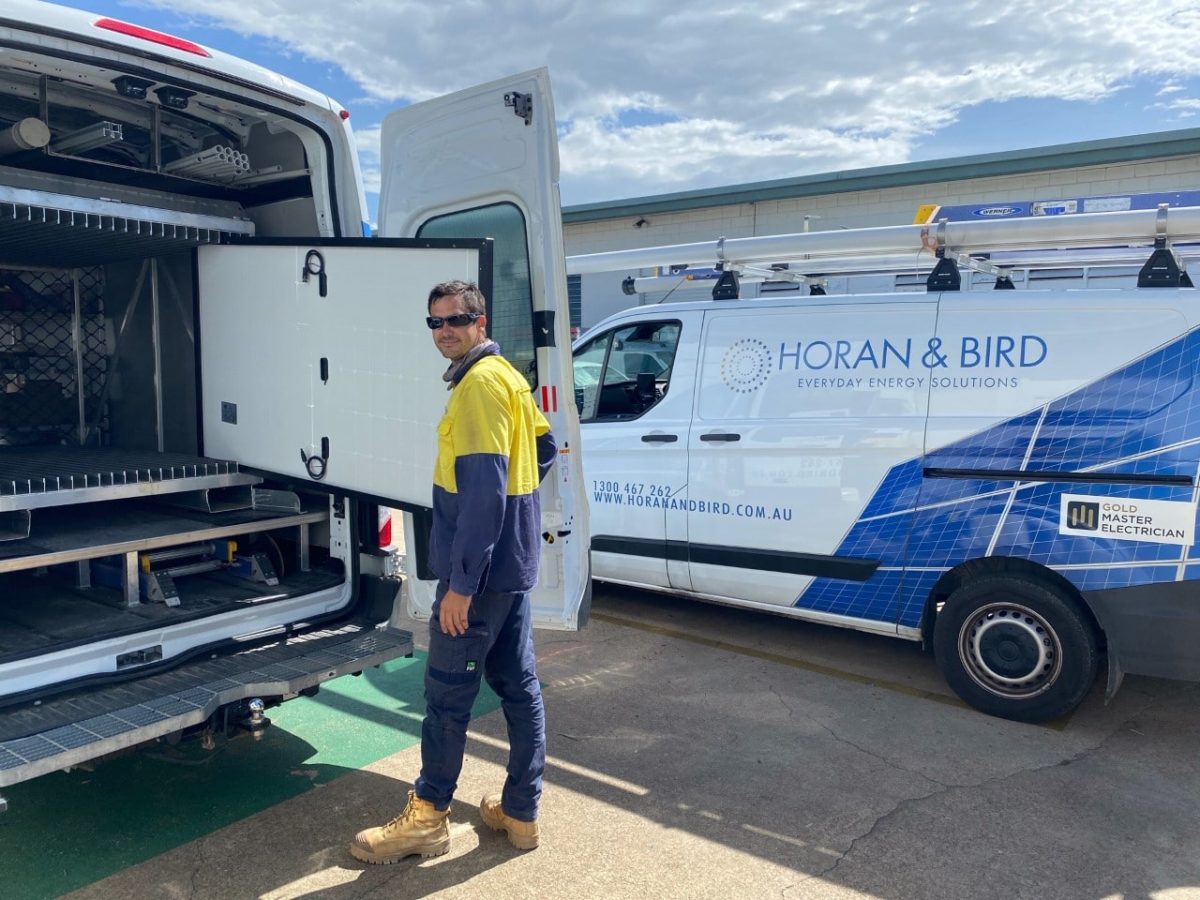Queensland-based solar installer Horan and Bird has designed a racking system that fits in a company van, negating the need to use trailers and providing a safe, secure and simple solution for transporting solar modules.
The racking system comprises an aluminum frame fitted with opposing channels into which the solar modules slide. A full-length latch is then dropped down from the top of the rack to secure the modules in place. The prototype can be adjusted to fit different size frames, has space for more than 20 modules and has been designed to fit inside a standard van.
Horan and Bird corporate services manager Nicola Howie told pv magazine the racking system had been designed and manufactured in house by the Horan and Bird team.
“We worked with an engineer but the boys in our operations team fully designed it and integrated it,” she said, adding safety had been the key driver behind the design.
“Land transport is our biggest risk in the industry. It’s not installing the solar panels, it is land transport,” she said.
“We’ve been installing solar for more than 10 years and we saw our biggest claims relating to trailers; shoulder claims, neck claims, back claims from lifting trailers with panels in them to connect to a van.
“Also, on the road. We do a lot of highway travel and the trailers are super unsafe. That’s why we went down the path of a fully integrated van.”
Howie said the company has fitted the racking system into only one van but plans to eventually upgrade the entire fleet of 10 vehicles.
“This is our first,” she said. “We wanted to integrate one and make sure it’s viable and it is. We are really happy with it and now we are in the process of transitioning the rest of the fleet.”

The unveiling of Horan and Bird’s racking system is timely after video footage emerged earlier this week showing a driver in Brisbane narrowly avoiding a serious incident after two solar modules flew out of a trailer in front of them.
The driver was filming while travelling along a major highway in Brisbane on Wednesday when the incident occurred.
Popular content
Dashcam video uploaded to social media by Queensland Police shows two solar panels flying out of a trailer being towed behind a ute and smashing in front of the car. The driver of the ute remained oblivious.
Horan and Bird group manager and company founder John Horan said safety during transportation remains a major issue for the industry.
“Land transport is one of the most significant risks for a solar company and driving around with trailers on the back, especially on the highway is risky,” he said.
“Some people are saying this racking system may not be as efficient as getting a forklift and throwing a pallet into a trailer but to be honest, what is efficiency when it comes to safety?”
Horan and Bird, which has installed more than 26,000 solar systems equating to 150 MW of solar since 2009, said the new racking system also provides the added benefit of less rubbish on job sites.

It also protects the solar modules from damage during transportation, reducing the risk of stress-related microcracks at cell level, which can affect both energy output and the system lifetime of a solar PV system. Microcracks also have the potential to produce hot spots.
“That is one of the reasons that we did it, but it is not the main reason,” Horan said. “But it is an issue in the industry and is something we were conscious off.”
The racking system has already attracted “significant” interest from other installers, he added.
“It’s unbelievable. We didn’t design this to sell it but so many people want one. We cannot believe how many people want to do it themselves now.
“They know how dangerous it is, driving around with trailers and pallets, but we’re not a manufacturing company, we’re a solar company. Someone else can probably build them cheaper than us.”
This content is protected by copyright and may not be reused. If you want to cooperate with us and would like to reuse some of our content, please contact: editors@pv-magazine.com.



This is just a thought. Instead of installing the racking length-ways in the van, why not install them side-ways in longer length covered/enclosed vehicles.
This could allow for panels to be loaded and unloaded from the side, or sides, of the convayance, saving time.
I’m not sure of the dimensions, but it is possible that a far greater number of panels could be carried, with less wasted space.
Also, would it be more efficient to load the panels flat, rather than on their edge. It may again allow for a greater number to be carried?
I do not think that they will want the panel transported in flat condition, as it would be more exposed to road vibration hazards.